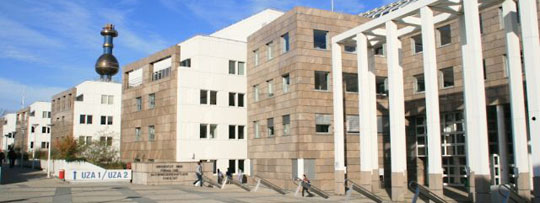Donnerstag, 01. Dezember 2016, 17:00 - 18:00 iCal
Guest Lecture by Prof.Dr. Olaf PONGS
"Structural and functional aspects of ion channel gating”
UZA 2, Hörsaal 6
Althanstraße 14, 1090 Wien
Lecture
The Doctoral Program
ION CHANNELS AND TRANSPORTERS AS MOLECULAR DRUG TARGETS („MolTag“)
is pleased to invite you to the following lecture:
"Structural and functional aspects of ion channel gating”
by Prof.Dr. Olaf PONGS
CIPPM, Faculty of Medicine, Saarland University, Homburg, Germany
on: Thursday, December 1st 2016, 05:00 pm (17:00 Uhr)
at: UZA II, Althanstraße 14, Lecture Hall 6 (Pharma and Food Lecture Series)
ABSTRACT: Potassium (K+) channels are transmembrane proteins that conduct the selective passage of potassium ions across the plasma membrane. K+ channels are fundamental to the wellbeing of cells across the entire kingdom of animals, plants, yeasts, and bacteria. Their activity is highly regulated either by molecules, e.g. second messengers, or by changes in physical environment, e.g. temperature, light, membrane potential. The major role of K+ channels is to guard resting membrane potential and to counteract membrane depolarization. In mammals close to 100 different K+ channels are expressed, and many exhibit characteristics of transient activation, i.e. activation is rapidly followed by inactivation, which renders the K+ channel reciprocal to subsequent activation. Thus, K+ channel activation may initiate a gating cycle, which consists of activation, inactivation and recovery of inactivation. Crystal structures of K+ channels dissolved in micelles have provided most important structural information. We have used a combination of electrophysiological patch-clamp studies with solid state NMR spectroscopy to obtain structural information on the KcSA channel in a lipidic environment. The results have enabled us to obtain detailed structures of the KcSA channel representing various states of activity and to elucidate structural and functional principles of a K+ channel gating cycle. Furthermore, the data indicate that specific lipid-KcSA interactions are instrumental for stabilizing an opened KcsA channel pore. These studies provide fundamental insights into the molecular rules that govern K+ channel gating with obvious implications for understanding K+ channel physiology and pharmacology.
Alexander Prokofyev, Olaf Pongs (CIPPM, Faculty of Medicine, Saarland University, Homburg, Germany)
Elwin van der Cruijsen, Marc Baldus (NMR spectroscopy, Bijvoet Center for Biomolecular Research, Utrecht University, Utrecht, Netherlands)
Contact: Doctoral Program MolTag, Dept. of Pharmacology and Toxicology; moltag.univie.ac.at, Office.moltag@univie.ac.at
Veranstalter
Doktoratskolleg "Molecular Drug Targets" (MolTag)
Kontakt
Susanne Menschik-Zunzer
Department of Pharmacology and Toxicology
DK Molecular Drug Targets
01 5277 55320
susanne.menschik-zunzer@univie.ac.at, office.moltag@univie.ac.at
Erstellt am Montag, 14. November 2016, 12:37
Letzte Änderung am Dienstag, 22. November 2016, 09:12

